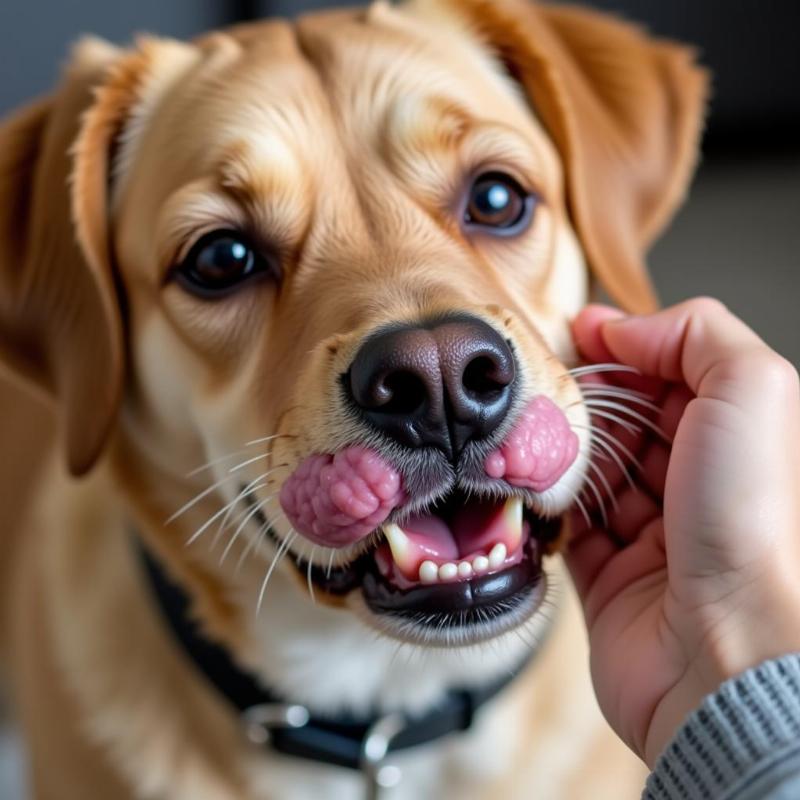A curious canine encountering a buzzing bee can be a recipe for a painful experience. So, what happens if a dog eats a bee? The most common outcome is a sting, usually inside the mouth or on the face. This can cause pain, swelling, and discomfort for your furry friend. Knowing what to do in such a situation is crucial for every dog owner in the US.
Understanding the Risks When a Dog Eats a Bee
Bee stings, while typically not life-threatening, can cause significant distress to your dog. The location of the sting is a major factor. A sting on the paw is usually less concerning than a sting inside the mouth, throat, or nose, which can obstruct airways. Allergic reactions, though rare, can be serious and require immediate veterinary attention. Knowing the signs of an allergic reaction, such as difficulty breathing, facial swelling, or hives, is vital.
Signs and Symptoms of a Bee Sting in Dogs
Recognizing the signs of a bee sting can help you act quickly. Look for swelling, redness, and pawing at the affected area. Your dog may also whine, yelp, or exhibit other signs of pain. Excessive drooling or difficulty swallowing can indicate a sting inside the mouth. If the sting is in the nose, you might observe sneezing or discharge.
 Dog Stung by a Bee
Dog Stung by a Bee
First Aid for Bee Stings in Dogs
If your dog eats a bee and gets stung, remain calm. First, try to remove the stinger if it’s visible. A credit card or flat object can be used to scrape it out, avoiding squeezing, which can release more venom. Apply a cold compress to the affected area to reduce swelling and pain. You can also give your dog a paste of baking soda and water to neutralize the venom. Monitor your dog closely for any signs of an allergic reaction.
When to Seek Veterinary Care
While most bee stings can be managed at home, some situations require immediate veterinary attention. If your dog exhibits signs of an allergic reaction, such as difficulty breathing, facial swelling, or vomiting, rush to the nearest veterinary clinic or emergency animal hospital. Similarly, if the sting is inside the mouth or throat, causing difficulty swallowing or breathing, seek immediate professional help.
Preventing Bee Stings in Dogs
Prevention is always better than cure. Keep an eye on your dog when they’re outside, especially around flowers and plants where bees are likely to be present. Consider training your dog to “leave it” when they encounter a bee. Regularly check your yard for beehives and have them removed professionally if necessary.
Conclusion
Knowing what happens if a dog eats a bee empowers you to act quickly and appropriately. Being aware of the signs, symptoms, and first aid measures can significantly reduce your dog’s discomfort and prevent potential complications. Remember, swift action and veterinary care when necessary are crucial for your furry friend’s well-being.
FAQ
- How long does the swelling from a bee sting last in dogs? The swelling typically subsides within a few days, but it can last longer in some cases.
- Can I give my dog Benadryl for a bee sting? While Benadryl can be helpful, consult your vet for the appropriate dosage and to ensure it’s safe for your dog.
- Are some dogs more allergic to bee stings than others? Yes, just like humans, some dogs can have more severe allergic reactions to bee stings.
- What if I can’t find the stinger? If you can’t locate the stinger, don’t panic. Focus on managing the swelling and pain.
- Can bee stings be fatal to dogs? Although rare, severe allergic reactions to bee stings can be life-threatening.
- What are the signs of an allergic reaction in dogs? Difficulty breathing, facial swelling, hives, vomiting, and collapse are signs of an allergic reaction.
- How can I prevent my dog from eating bees? Supervise your dog outdoors, train them to “leave it,” and remove any beehives from your yard.
Related Articles
- is chapstick harmful to dogs
- what happens if my dog eats chapstick
- are rhino beetles dangerous to dogs
- dogs who ate a bee
Beautdogs.us is your premier source for comprehensive dog care information, breed-specific guidance, and product recommendations in the US. We offer expert advice for both new and experienced dog owners, covering everything from health and nutrition to training and grooming. Beautdogs.us is committed to helping you provide the best possible care for your canine companion. Connect with our experts at [email protected] or call us at +1 501-555-7529. Visit Beautdogs.us for more helpful tips and resources.